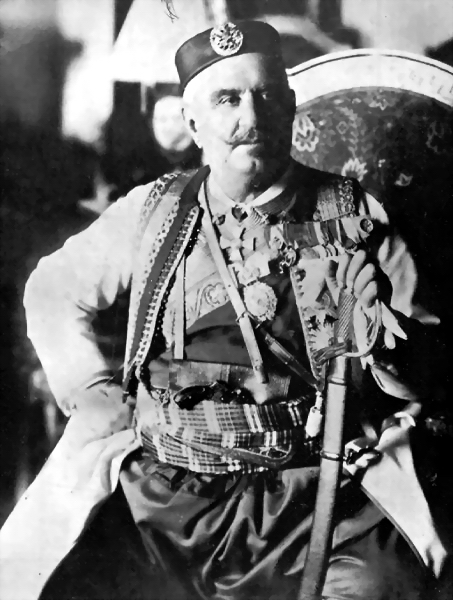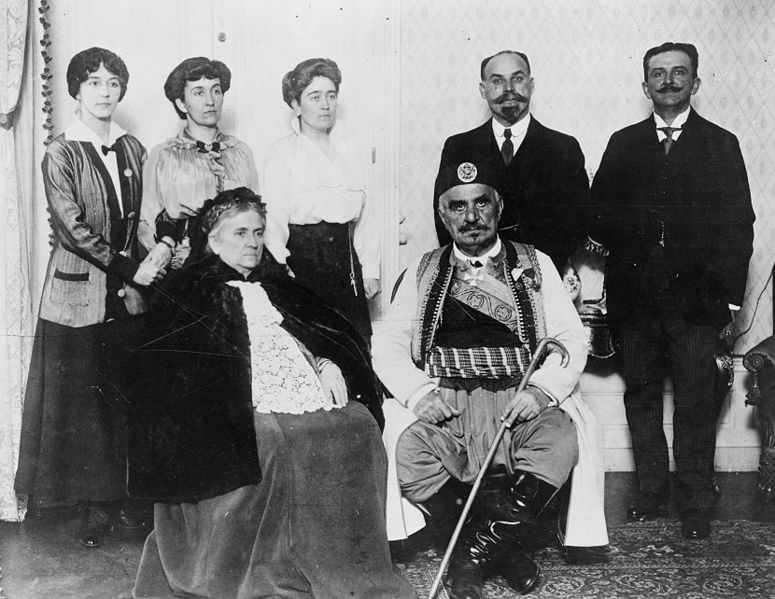<Back to Index>
- King of Montenegro Nikola I Mirkov Petrović - Njegoš, 1841
PAGE SPONSOR


Nikola I Mirkov Petrović - Njegoš (Serbian Cyrillic: Никола I Мирков Петровић - Његош) (October 7 [O.S. September 25] 1841 - March 1, 1921) was the only king of Montenegro, reigning as king from 1910 to 1918 and as prince from 1860 to 1910. He was also a poet, notably penning "Onamo, 'namo!", a popular song from Montenegro.
Nikola was born in the village of Njeguši, the ancient home of the reigning House of Petrović. His father, Mirko Petrović - Njegoš, a celebrated Montenegrin warrior, was elder brother to Danilo I of Montenegro, who left no male offspring. After 1696, when the dignity of Vladika, or prince - bishop, became hereditary in the Petrović family, the sovereign power had descended from uncle to nephew, the Vladikas belonging to the order of the black clergy (i.e., monastic clergy) who are forbidden to marry. A change was introduced by Danilo I, who declined the episcopal office, married and declared the principality hereditary in the direct male line. Mirko Petrović - Njegoš having renounced his claim to the throne, his son was nominated heir - presumptive, and the old system of succession was thus accidentally continued.
Prince Nikola, who had been trained from infancy in martial and athletic exercises, spent a portion of his early boyhood at Trieste in the household of the Kustic family, to which his aunt, the princess Darinka, wife of Danilo II, belonged. The princess was an ardent francophile, and at her suggestion the young heir - presumptive of the vladikas was sent to the Lycée Louis - le - Grand in Paris. Unlike his contemporary, King Milan of Serbia, Prince Nikola was little influenced in his tastes and habits by his Parisian education; the young highlander, whose keen patriotism, capability for leadership and poetic talents early displayed themselves, showed no inclination for the pleasures of the French capital, and eagerly looked forward to returning to his native land.
Nikola was a member of the "United Serbian Youth" (Уједињена омладина српска) during its existence (1866 - 1871). After the organization was prohibited in the Principality of Serbia and Austro - Hungary, the "Fellowship of the Serb liberation and unification" (Дружина за ослобођење и уједињење српско) was established by Nicholas, Marko Popović, Simo Popović, Mašo Vrbica, Vasa Pelagić, and others, in Cetinje (1871).
Nikola was still in Paris when, in consequence of the assassination of his uncle Danilo I, he succeeded as prince (August 13, 1860). In November 1860 he married Milena, daughter of the vojvoda Petar Vukotić.
In the period of peace which followed Nikola carried out a series of military, administrative and educational reforms. The country was embroiled in a series of wars with the Ottoman Empire between 1862 and 1878. In 1867 he met the emperor Napoleon III at Paris, and in 1868 he undertook a journey to Russia, where he received an affectionate welcome from the tsar, Alexander II. He afterwards visited the courts of Berlin and Vienna. His efforts to enlist the sympathies of the Russian imperial family were productive of important results for Montenegro; considerable subventions were granted by the tsar and tsaritsa for educational and other purposes, and supplies of arms and ammunition were sent to Cetinje. In 1871 Prince Dolgorukov arrived at Montenegro on a special mission from the tsar, and distributed large sums of money among the people. In 1869 Prince Nikola, whose authority was now firmly established, succeeded in preventing the impetuous highlanders from aiding the Krivosians in their revolt against the Austrian government; similarly in 1897 he checked the martial excitement caused by the outbreak of the Greco - Turkish War.
Follow me Montenegrins - on to Bar, on to our Serb Bar, on to Serb sea!...
In 1876 Nikola declared war against Turkey; his military reputation was enhanced by the ensuing campaign, and still more by that of 1877/78, during which he captured Nikšić, Bar and Ulcinj. The war resulted in a considerable extension of the Montenegrin frontier and the acquisition of a seaboard on the Adriatic. He justified the war as a revenge for the Battle of Kosovo in 1389. In 1876 he sent a message to the Montenegrins in Herzegovina:
- Under Murad I the Serbian Tsardom was destroyed, under Murad V it has to rise again. This is my wish and wish of all of us as well as the wish of almighty God.
The independence of Montenegro was recognized at the Congress of Berlin in 1878 and in the succeeding decades Montenegro enjoyed considerable prosperity and stability. Education, communications and the army expanded greatly (the latter with support from Imperial Russia). In 1883 Prince Nikola visited the sultan, with whom he subsequently maintained the most cordial relations; in 1896 he celebrated the bicentenary of the Petrović dynasty, and in the same year he attended the coronation of the Tsar Nicholas II; in May 1898 he visited Queen Victoria at Windsor Castle.
In 1900 Nikola took the style of Royal Highness. He gave Montenegro its first constitution in 1905 following pressure from a population eager for more freedom. He also introduced West - European style press freedom and criminal law codes. In 1906, he introduced Montenegrin currency, the perper. On August 28, 1910, during the celebration of his jubilee, he assumed the title of king, in accordance with a petition from the Skupština. He was at the same time gazetted field marshal in the Russian army, an honor never previously conferred on any foreigner except the Duke of Wellington. When the Balkan Wars broke out in 1912 King Nicholas was one of the most enthusiastic of the allies. He wanted to drive the Ottomans completely out of Europe. He defied the Powers and captured Scutari despite the fact that they blockaded the whole coast of Montenegro. Again in the Great War which began in 1914 he was the first to go to Serbia's aid to repel the Austrian forces from the Balkan Peninsula. He was personally a huge supporter of Serbdom, and wished for Serb unity. However, he was bitterly opposed to the Karađorđevićs.
After the First World War Montenegro united with the other south Slav lands, to form the Kingdom of Serbs, Croats and Slovenes, which was renamed Yugoslavia in 1929. Nikola went into exile in France 1918, but continued to claim the throne until his death in Antibes three years later. He was buried in Italy. In 1989, the remains of Nikola, his queen Milena, and two of their twelve children were re-buried in Montenegro.
King Nikolas and the Kingdom of Montenegro are remembered briefly in F. Scott Fitzgerald's the Great Gatsby, where its eponymous main character reminisces on how for his accomplishments and heroic endeavors during the First World War the King confers unto him the highest honor of the Kingdom the Orderi di Danilo. Gatsby duly presents the medal for his guest to examine which reads on the legend Montenegro, Nicolas Rex and on its reverse: Major Jay Gatsby - For Valour Extraordinary.